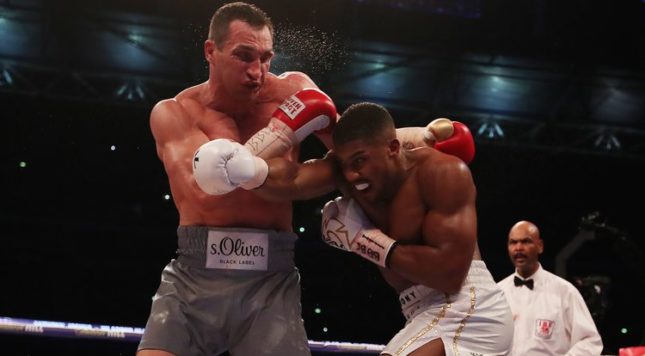By every visible measure, Anthony Joshua is the Prince Who Was Promised. And wielding a flaming sword, on April 29, Azor Ahai was reborn “amid smoke and salt.”
The metaphor is inexact, sure. Because the foe Joshua vanquished was Wladimir Klitschko, an all-around good guy who earned new admiration that evening, there’s not a perfect “savior” angle. Nor can we say for certain how long Joshua will reign of a golden era among the long moribund, former glamour division of boxing: heavyweight.
But then again, how long does any golden era last on Westeros, let alone Earth? We can say absolutely that April 29 was a shining moment for the sport, in a corner of the boxing world that sorely needed it, and if it turns out Joshua’s reign is long and joyous, that will be remembered as the moment the prince showed more than just promise.
Joshua had long appeared to be the future of the heavyweight class, more than any contender or pretender who looked the part during the Klitschko era. Tyson Fury had some claim to the throne as heir, since he had beaten champ Wladimir via Befuddlement-12 back in 2015, his peculiar rhythms inside the ring just as flabbergasting as his oddball behavior outside it. Fury, though, seems undone by the same erratic qualities that made him interesting as a personality and dangerous as a boxer, sidelined due to suspension and self-imposed exile. And the Klitschko-Fury fight was a bore; it was worth watching only for what it represented and how strangely Klitschko suffered his first loss in almost 10 years.
Joshua-Klitschko? Now that was a riveting spectacle. Almost like it was some kind of Fight of the Year. It had all the meaningfulness of Klitschko-Fury, despite giving Klitschko his second straight loss, because of just how dynamic he was against Joshua compared to Fury; at long last, in his relative dotage, Klitschko was laying it all on the line, popping the precious safety bubble he’d erected after some early-career knockout losses. And that version of Klitschko, it turned out, was a bad, bad man.
Not only did it have the stakes, it had multiples of the fun we got from Klitschko-Fury. Yes, they did start by probing, mostly. But things heated up big time in the 5th: Joshua dropped Klitschko for the first time in forever. Klitschko rallied back to damn near win the round. He then dropped Joshua right back in the 6th, and suddenly Joshua’s early edge was narrowing. By the 10th round or so, it was a pretty even contest.
Then, in the 11th, Joshua landed an uppercut that seemed to dip down into the fires of hell on its way up to Klitschko’s chin. The fight should’ve been over instantly but that’s how outstanding Klitschko was, that he survived it at all. And yeah, it was effectively over after that. Still, you gotta admire the fortitude to withstand a shot like that.
Violence is definitely part of boxing’s appeal. But boxers’ ability to do anything other besides crumple into a heap in moments like that is some kind of monument to mankind, one kind of thing that makes the sport worth watching, one kind of thing that makes it dramatic, and the kind of thing that for Klitschko specifically redeemed him many a year of frustrating clinching and negative ultra-caution. We always knew he was good. We never knew he could be so fucking tough.
And with Klitschko elevated, so elevated too was Joshua’s win and performance. This wasn’t a passing of the torch. This was Joshua ripping it away from the best heavyweight of his time, and it was no gentle affair. Joshua damn near lost an arm and a leg in the process, thereby demonstrating his own toughness. The talent was evident: Joshua clearly could punch, and his Olympic pedigree gave him the skills. Dillian Whyte planted the seed of doubt about Joshua’s chin and/or steel will, even though he overcame Whyte in a shaky performance. If Whyte did this to him, what might a really good heavyweight do to him?It turns out the answer is, “Not enough.”
The heavyweight division has had its moments during the Klitschko years, but more often than the heavyweights roaming its terrain were plodding, fat, both or worse, and the fights hardly worth watching. Joshua and Klitschko looked more like they had emerged more likely from forges than a womb, and delivered a classic, probably the best heavyweight bout since 2003. If the once-signature division of the sport can return to its heights, if boxing is to thrive at maximum capacity, and if the big boys of boxing can restore their rightful claim to owning the “baddest man on the planet,” it will be nights like this that make it all possible. For one year, finally, in at least one way — producing the best fight of 2017 — the heavyweights ruled.
(image via)

